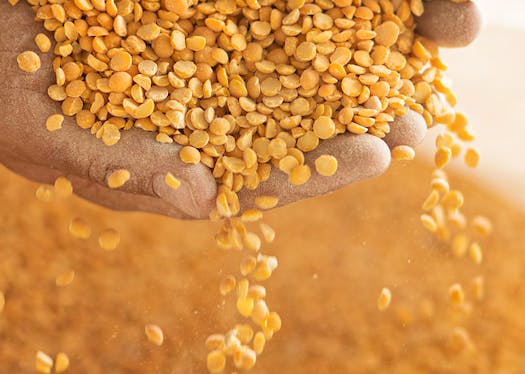November 25, 2025 | 16:10 GMT +7
November 25, 2025 | 16:10 GMT +7
Hotline: 0913.378.918
November 25, 2025 | 16:10 GMT +7
Hotline: 0913.378.918

Yellow peas at a Puris facility. The Minneapolis-based company won a second tariff case against subsidized imports from China.
Tariffs of up to 270% will be levied on imports of Chinese pea protein to counteract the "dumping" of heavily subsidized imports that threatened American farms and manufacturers, the federal Department of Commerce announced last week.
The decision is a victory for Minneapolis-based Puris, the leading pea protein supplier in North America, which brought the case to federal trade authorities last year.
"For years, unfair trade practices threatened the future of American pea protein manufacturers," Puris CEO Tyler Lorenzen said in a statement.
Puris idled a facility in Wisconsin last summer and laid off 48 people as a glut of cheap imports were sold for what regulators call "less than fair value."
More than 144 million pounds of pea protein were imported from China in 2022, according to the International Trade Administration. That's $269 million worth of product.
The anti-dumping tariffs will require a cash deposit from Chinese exporters "equal to the weighted average amount by which normal value exceeds U.S. price," according to federal documents. These tariffs are in addition to up to 340% in countervailing duties, which received initial approval in December.
That could lead to higher pea protein prices across the market — good for farmers but potentially adding to the final price consumers pay.
Pea protein is found in many plant-based products and has seen significant growth and adoption in recent years. Grand View Research pegged the global pea protein market at $1.9 billion in 2022 and predicts it will reach $4.7 billion by the end of the decade.
Puris, which is backed by Cargill, is a key supplier for Beyond Meat and a number of other plant-based consumer brands.
The Department of Commerce has slapped tariffs on imports of Chinese pea protein after finding they were heavily subsidized and "dumped" in the U.S. below fair prices.
(Startribune)

(VAN) An Giang promotes supply-demand connections, standardizes quality and builds value chains, creating a foundation for sustainable bird’s nest development and aiming to expand exports.
/2025/11/24/5339-4-nongnghiep-075331.jpg)
(VAN) Recently, the conference on 'Sustainable Fisheries Linkage Chain - Tilapia for Export' took place in Tien Hai commune, Hung Yen province.
/2025/11/21/4309-2-153400_128.jpg)
(VAN) Green and low-emission rice is paving the way for Vietnamese rice to enter high-end markets, marking the beginning of a transformation journey toward greening and elevating the national rice brand.

(VAN) ‘Right to Win’ outlines a national action plan that shapes a new vision for Viet Nam’s agriculture in an era of renewal and global integration.

(VAN) Lam Dong’s farmed sturgeon output this year is expected to reach 2,300 tons, worth VND 450 billion, affirming the brand’s position on the market.

(VAN) A surge in Ukrainian egg exports, largely driven by soaring sales to the UK over the last few years, has notably pushed up egg prices on the domestic market.

(VAN) The price of Arabica Catimor coffee in Quang Tri is currently at VND 25,000–27,000/kg (fresh cherries), the highest level ever recorded